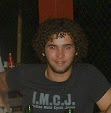As you probably have noticed from some of my previous posts (this or this other), I am a big fan of Prof. Steven Pinker. He is both an active scholar and a public intellectual that I hold in great regard. Author of many books, Pinker is mainly interested in psycholinguistics and cognitive science, fields in which he has done major breakthroughs. Apart from the meaning of the ideas he usually advocates for, Pinker is excellent at dissecting knowledge and data into pieces easy to understand by the general public. The latter partners well with his great communication skills to output curated science dissemination, but I believe that it is also the trace of a great mind operation.
Recently, I came across a research line of his on "Quantitative Trends in Violence" I did not know about. It stroke me with surprise, first, because it is quite distant from his main area of expertise, and then, because I have a long-standing interest in regularities in History and quantitative analysis of historical facts. (By the way, Pinker is not the only one that combine linguistics and history as research interests. There is also Murray Gell-Mann (Nobel prize, 1969), which -of course- adds physics to this intellectual melting pot).
Hereby, I suggest this conference that Pinker held at the University of Edinburgh (UK) on the topic, which stands as well as a presentation of his book "The Better Angels of our Nature: Why Violence has Declined" (2011). Within the talk, Pinker drives you through counterintuitive and yet quantitatively indisputable arguments about the decrease in human violence over millennia.
I want to say at last that there are -as my wife often say- certain kinds of truth that it is ethically alright not to promulgate, and in fact, our moral principles might strongly support that we don't. For instance, if we happen to discover that climatic change is not entirely the responsibility of the human being. Probably, we are better knowing that we are responsible... Questionable as this last comment is, Pinker clearly states that his truth is not inconvenient at all. If violence is decreasing because of us, it is a good to know that it is to discern why. Nevertheless, it is strange that for once we need to ask: What are we doing well?
I leave you to it. Enjoy!
Recently, I came across a research line of his on "Quantitative Trends in Violence" I did not know about. It stroke me with surprise, first, because it is quite distant from his main area of expertise, and then, because I have a long-standing interest in regularities in History and quantitative analysis of historical facts. (By the way, Pinker is not the only one that combine linguistics and history as research interests. There is also Murray Gell-Mann (Nobel prize, 1969), which -of course- adds physics to this intellectual melting pot).
Hereby, I suggest this conference that Pinker held at the University of Edinburgh (UK) on the topic, which stands as well as a presentation of his book "The Better Angels of our Nature: Why Violence has Declined" (2011). Within the talk, Pinker drives you through counterintuitive and yet quantitatively indisputable arguments about the decrease in human violence over millennia.
I want to say at last that there are -as my wife often say- certain kinds of truth that it is ethically alright not to promulgate, and in fact, our moral principles might strongly support that we don't. For instance, if we happen to discover that climatic change is not entirely the responsibility of the human being. Probably, we are better knowing that we are responsible... Questionable as this last comment is, Pinker clearly states that his truth is not inconvenient at all. If violence is decreasing because of us, it is a good to know that it is to discern why. Nevertheless, it is strange that for once we need to ask: What are we doing well?
I leave you to it. Enjoy!

Gabriel, this video is extremely interesting and should put us in an optimistic mood. Ideas like the expansion of book printing or commerce contributing to the decrease of violence are very comforting. But somehow I am not able to get in the optimistic mood because of the climate change problems we should be dealing with. And I guess we are dealing with these problems, we are trying to solve them, but they are very complex and urgent. Anyway, lets have faith in the human kind!
ReplyDelete